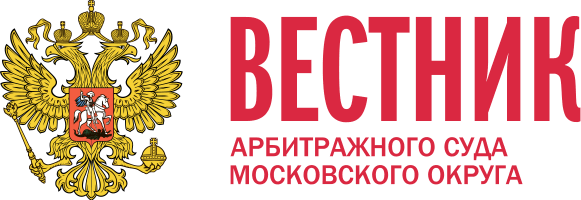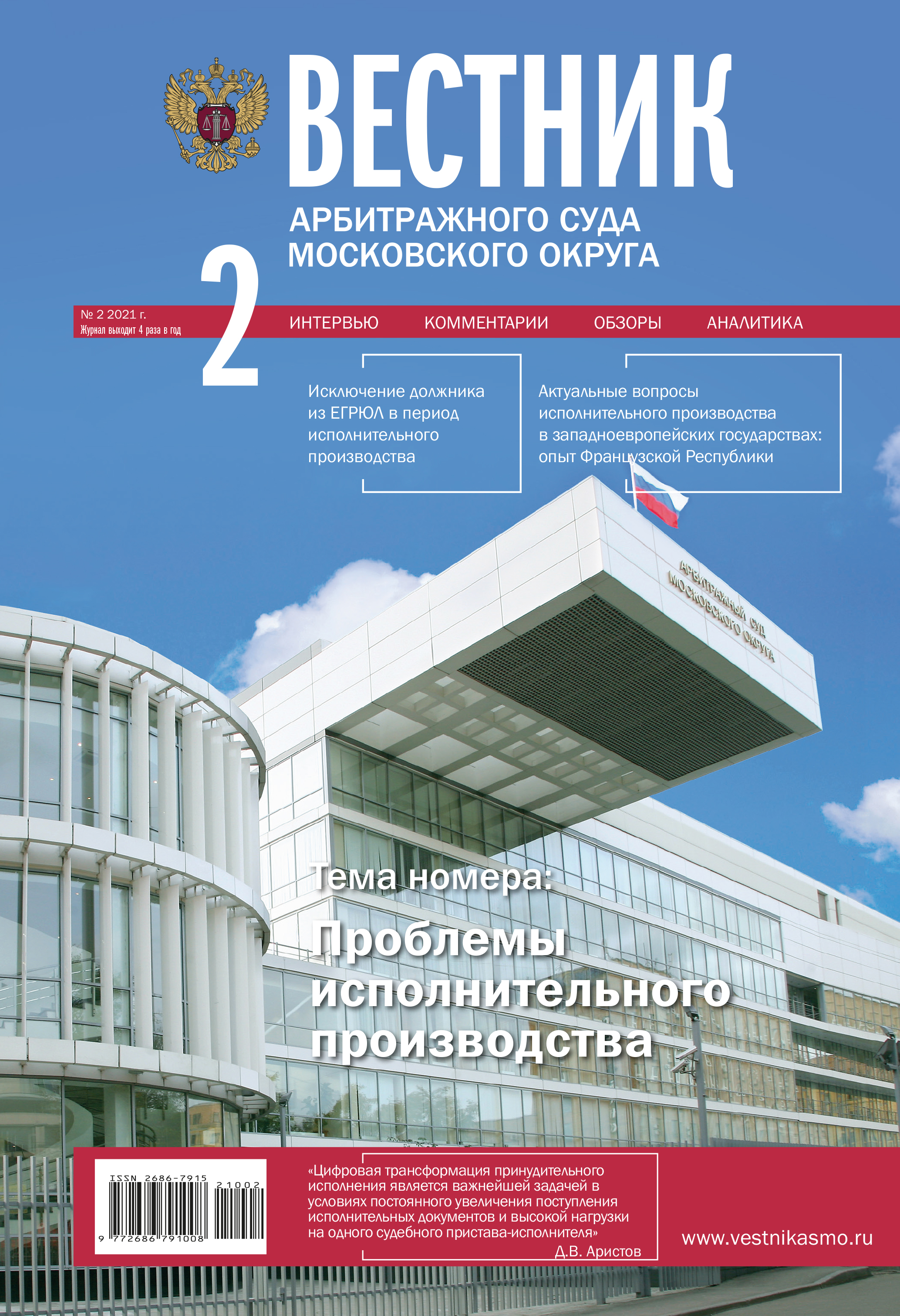Courts News
News of Moscow District Courts
Interview of the issue
D.V. Aristov. Digital transformation of compulsory enforcement is the most important task in times of the constant increase in the flow of enforcement documents and the high load on one bailiff
Topicality
Release of Property Belonging to a Third Party from Seizure Imposed as Part of Enforcement Proceedings
Analytics: Problems of Enforcement Proceedings
Pleshanova O.P.
Debtor’s Remove from the State Register during Enforcement Proceedings
The article exams the Russian Constitutional Courts’ decision No. 20-P from the 21th of May, 2021. This decision concerns the subsidiary liability of controlling persons of the debtor removed from the Unified State Register of Legal Entities (the Register). At the same time the Constitutional Court has revealed the collision between the extrajudicial procedure allowing to remove from the Register of debtors have been supported inoperative and the enforcement proceedings, during the period of which the debtor was excluded from the Register. The Constitutional Court has formulated a standard for assessing the behavior of a claimant who is a consumer, which in the long term may change the standards for assessing the state’s responsibility for the actions (inaction) of the enforcement authorities.
Keywords: The Constitutional Court of the Russian Federation, the Unified State Register of Legal Entities, the extrajudicial remove of the legal entities from the Unified State Register of Legal Entities, the enforcement proceedings, the behavior of a claimant, the standards for assessing the state’s responsibility for the actions (inaction) of the enforcement authorities
DOI: 10.46279/ASMO.2021.62.38.001
Reshetnikova I.V., Tsaregorodtseva I.A.
Executive Production Issues: Theory and Practice
The article discusses various legal issues related to the issuance of a writ of execution, the consequences of erroneous collection in favor of an improper recipient of funds, some problems of identifying a debtor under a writ of execution on the basis of both theory and judicial practice. Attention is paid to the developing judicial practice on the recovery of astreint (judicial penalty) in cases of enforcement proceedings.
Keywords: issuance of a writ of execution under a settlement agreement, in case of legal succession, a duplicate of a writ of execution, identification of the debtor, erroneous collection, astreint (judicial penalty) in cases of enforcement proceeding
DOI: 10.46279/ASMO.2021.59.66.002
Sorokin V.P.
Conditions of Recognition and Enforcement by Arbitrazh Courts in the Russian Federation of Foreign Court Judgments and Foreign Arbitral Awards
The article is devoted to the important problem of recognition and enforcement of the decisions of foreign courts and arbitral tribunals by Russian arbitrazh (commercial) courts. Three topical issues are considered. The first concerns the need to harmonize the norms of the Arbitrazh Procedure Code with the provisions of the Constitution of the Russian Federation. In the light of this, the role of the Hague Convention on the Recognition and Enforcement of Foreign Judgements in Civil and Commercial Matters in relation to the establishment of uniform criteria for the procedural legislation in the territory of each state party to the Convention is emphasized. The second issue relates to the application by the courts of the criterion of reciprocity in reviewing decisions of foreign courts, and the third issue relates to the assessment by the court of the foreign decision as to the good faith of the parties involved. The necessity of the further decision of problems connected with recognition and enforcement of decisions of foreign courts in the Russian Federation is stressed.
Keywords: grounds for recognition and enforcement of foreign judgments in Russia, reasons for impossibility of enforcement of foreign court decisions, the criterion of reciprocity as a binding principle of international law, international treaties of Russia as sources of domestic procedural law in arbitrazh court
DOI: 10.46279/ASMO.2021.38.19.003
Ulyotova G.D., Baymoldina B.Kh.
In Search of a More Effective Model for Enforcement of Judicial Decisions and Acts of Other Bodies: Through the Experience of the Republic of Kazakhstan
The creation of an effective system for the execution of acts of courts, other organs and officials is one of the most important tasks for any State, since it is at this stage that the real protection of the violated or disputed right is carried out. The effectiveness of enforcement proceedings, as is known, depends on the effectiveness of the chosen execution model. Many authors note the perspective and success of the private-law model of execution of enforcement documents, based on the status of the bailiff as a free professional. At the same time, the choice of a particular execution system is explained by many features and factors. This article discusses issues of the implementation of the institute of private bailiffs in Russia in the light of recent discussions of this problem at the level of governmental agencies, and also highlights the main provisions of such an institution in Kazakhstan. We believe that the experience of Kazakhstan will make it possible to identify the best ways to carry out a “painless” reform of the system of enforcement bodies in Russia.
Keywords: Russia, Kazakhstan, enforcement proceedings, private-law model of execution, effectiveness of enforcement proceedings, private bailiff
DOI: 10.46279/ASMO.2021.75.67.004
Solovyov A.A.
Topical Issues of Enforcement Proceedings in Western European States: Experience of the French Republic
The author examines the experience of the French Republic relating to the legal regulation of various institutions of enforcement proceedings. The article outlines the main directions of the reform of the enforcement proceedings in the European Union, as well as their implementation in the legislation of France. The main attention is paid to the study of civil enforcement procedures in the field of enforcement proceedings; mechanisms of recognition and enforcement of foreign judgments; changes in the field of immunities; peculiarities of the functioning of the institution of judges for the enforcement of judicial acts; using digital tools for the implementation of coercive measures and simplified procedures and other measures aimed at improving the efficiency of the enforcement of judicial acts.
Keywords: enforcement proceedings, foreign experience, French Republic, balance of interests of the creditor and the debtor, judges for the enforcement of judicial acts, immunities, coercive measures, digitalization, improving the efficiency of the system for the enforcement of judicial acts, simplified procedures
DOI: 10.46279/ASMO.2021.15.27.005
Analytics: Open Tribune
Tsindeliani I.A.
Correlation of Civil and Tax Law Institutions in the Regulation of Inheritance Relations
The article examines the approaches developed in theory and practice related to the use of civil and tax law institutions in the regulation of inheritance relations arising from the claims of heirs to include excessively paid or collected amounts of taxes, as well as amounts of tax benefits that were not actually received at the time of the testator’s death. The available approaches to this problem of federal executive authorities and to the developing judicial practice are analysed. The article substantiates the possibility of including in the inheritance estate excessively paid and collected amounts of taxes, as well as tax benefits not received at the time of the testator’s death, as part of the implementation of the appropriate procedure for their provision.
Keywords: taxes, inheritance, inheritance mass, personal income tax, VAT, property tax deduction, succession, property
DOI: 10.46279/ASMO.2021.24.43.006
Solodilov A.V.
Legal Relations under the Modern Russian Competition Law (Some Theoretical Aspects) (Part 1)
The article deals with theoretical issues of substantive and procedural competitive legal relations. On the basis of available scientific developments the author proposes a model of the legal system of insolvency (bankruptcy). The significance of organizational competitive legal relations as a connecting link between substantive and procedural components of this sphere is emphasized.
Keywords: insolvency (bankruptcy), legal relations, competition law, competitive process, substantive, procedural, organizational legal relations, system
DOI: 10.46279/ASMO.2021.24.43.006


